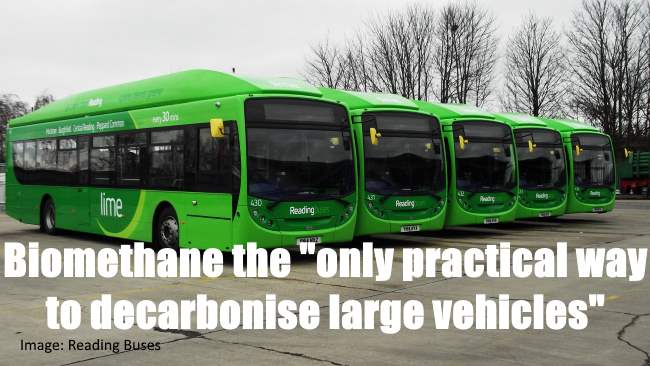The advantages of biogas are many and elsewhere on this blog we list them, but until now the biggest advantage of biogas (in Decarbonising Transport especially when “upgraded” to biomethane) has been waiting to be discovered.
Globally there is no large and successful city that is not suffering air pollution from the ever-rising numbers of cars, trucks and buses. Tens of thousands of people's lives are being shortened annually in each city, by invisible pollution, especially from diesel vehicles.
The best of all advantages of biogas is that it can solve air pollution from transport vehicles, and start saving lives, now.
We've all been reading for at least a decade about a new generation of eco-friendly, low-emissions vehicles which will cure the air-quality problems in our cities and conurbations.
But, after so many years where are all these vehicles? In the UK in 2022 only about 10% of cars alone are electric or hybrids.
There are models available of electric cars, and hybrid cars, but they are so expensive (even after considering grants available from the government) that their numbers will not be likely to grow significantly in the next 3 to 5 years, let alone 10 years.
Even worse, is the fact that heavy-vehicle transport (buses and trucks) are nowhere near capable of being powered by the heavy-duty battery power that heavy loads demand. Heavy goods vehicles (HGVs) are diesel-powered and by far the biggest polluters.
In Germany, the government is so worried that they have even been trying out the idea of fitting overhead lines (just as you see them over railway lines) over the motorway carriageways. These would power electric-powered HGVs around the country.
Can you imagine the danger to all of us from such electric cables on all our motorways? That's not to mention the appalling ugliness of such wires!
When did you last see an electric battery-powered bus?
or: Did you ever notice a hydrogen-powered bus?
No! Hydrogen buses don't exist!
But, all these vehicle types, powered by biogas ARE available NOW from mainstream commercial vehicles manufacturers. They don't emit dangerous pollution and the energy they consume is renewable. It's a huge advantage of Biogas!
It really is time for us all to stop looking for high-tech science-fiction solutions to solve city air pollution, for the moment. Far too many people's lives are being damaged every day by city pollution for that.
The REAL Advantage of Biogas is to Use it for Decarbonising Transport
One organisation that is doing its best to make people aware of the advantages of biogas, and in particular the unique advantage of biogas to reduce transport air pollution rapidly, is the UK's Anaerobic Digestion & Bioresources Association, and the paragraphs which follow are reproduced from their recent Press Release titled:
Biomethane is the ‘only practical way to decarbonise large vehicles’
- Head of anaerobic digestion trade body makes a statement in Air Quality News
- BEIS confirms today that biomethane suppliers can claim both RHI and RTFO
- Role of biomethane in decarbonising transport to be a key theme of global biogas expo.
Biomethane from anaerobic digestion (AD) is “the only practical means of decarbonising HGVs, buses, and other large vehicles” according to an article by the head of the UK’s AD industry.
Writing in Air Quality News yesterday, Charlotte Morton, Chief Executive of the Anaerobic Digestion & Bioresources Association (ADBA), said:
“Given how far hydrogen is from being a reliable option for transport and the difficulties in using electric batteries to power heavy vehicles, over the short to mid term biomethane is a technology-ready, cost-effective means of slashing emissions and particulate matter and improving air quality, and is the only practical means of decarbonising HGVs, buses, and other large vehicles.
“The UK has close to 100 AD plants already producing biomethane with dozens more being built, and the whole UK AD industry has sufficient capacity today to produce enough biomethane to power 80% of the UK’s entire bus fleet and the potential to produce enough biomethane to power 75% of all HGVs in the UK.”
It's also available now from the AD process, and that's the critical advantage that biogas has. AD is a natural process that breaks down organic wastes and purpose-grown crops to create a biogas that can then be upgraded to biomethane.
Biomethane-
Biomethane offers a 50-80% reduction in carbon emissions compared to diesel, depending on the feedstock used to generate the biogas.
Increasing numbers of bus and HGV fleets across the UK and around the world are turning to biomethane as a clean, low-cost fuel. In April the world’s largest fleet of biogas double-deck buses became operational in Nottingham.
Ms Morton's statement comes as the Department for Business, Energy and Industrial Strategy (BEIS) has announced today that producers of biomethane can now claim government support from both the Renewable Heat Incentive (RHI), for biomethane used to decarbonise the gas grid, and from the Renewable Transport Fuel Obligation (RTFO), for biomethane used as a transport fuel.
Ms Morton said:

“We've worked closely with our members, BEIS, DfT, Ofgem, and other trade associations to secure this outcome, which we see as a fabulous example of different stakeholders working together to develop a shared understanding and create future opportunities for investment.”
The role of biomethane as a transport fuel will be a key theme of UK AD & World Biogas Expo 2018, the world’s largest tradeshow dedicated solely to AD and biogas, taking place on 11th-12th July at the NEC in Birmingham. The expo, which is being organised by ADBA and the World Biogas Association, will feature panel discussions on stimulating the UK biomethane-for-transport market and biogas refuelling infrastructure, as well as case studies of biomethane bus fleets from around the world.
Press Release ENDS
Photo credit: Reading Buses
Recommended Reading (continuing the topic of the advantages of biogas for transport): ‘Thinking outside the NOx' – article by Charlotte Morton in Air Quality News
Anaerobic Digestion & Bioresources Association: www.adbioresources.org
ADBA is the trade association for the anaerobic digestion (AD) industry in the UK and companies and organisations working on novel technologies and processes that complement the anaerobic digestion process and products. With their members, they promote the economic and environmental benefits of AD in the UK.
We represent organisations from many sectors including AD operators, AD developers, AD equipment providers, water companies, farmers, food & drink retailers, waste companies, universities and more.
What Others are Saying About the Advantages of Biogas for Decarbonising Transport
Advantages of CNG (including Advantages of Biogas) for Transport Use – Biogas as Biomethane is a Renewable CNG:
- Natural gas vehicles have lower maintenance costs than other hydrocarbon-fuel-powered vehicles.
- CNG fuel systems are sealed, preventing fuel losses from spills or evaporation.
- Increased life of lubricating oils, as CNG does not contaminate and dilute the crankcase oil.
- Being a gaseous fuel, CNG mixes easily and evenly in air.
- CNG is less likely to ignite on hot surfaces, since it has a high auto-ignition temperature (540 °C), and a narrow range (5–15 percent) of flammability.
- CNG-powered vehicles are considered to be safer than gasoline-powered vehicles.]
- Less pollution and more efficiency:
- CNG emits significantly less pollution directly than gasoline or oil when combusted (e.g., carbon dioxide (CO2), unburned hydrocarbons (UHC), carbon monoxide (CO), nitrogen oxides (NOx), sulfur oxides (SOx) and PM (particulate matter)). For example, an engine running on petrol for 100 km emits 22 kilograms of CO2, while covering the same distance on CNG emits only 16.3 kilograms of CO2.
- Due to lower carbon dioxide emissions, switching to CNG can help mitigate greenhouse gas emissions.[12] However, natural gas leaks (both in the direct use and in the production and delivery of the fuel) represent an increase in greenhouse gas emissions. The ability of CNG to reduce greenhouse gas emissions over the entire fuel lifecycle will depend on the source of the natural gas and the fuel it is replacing.
- The lifecycle greenhouse gas emissions for CNG compressed from California's pipeline natural gas is given a value of 67.70 grams of CO2-equivalent per megajoule (gCO2e/MJ) by CARB (the California Air Resources Board), approximately 28 percent lower than the average gasoline fuel in that market (95.86 gCO2e/MJ).
- CNG produced from landfill biogas was found by CARB to have the lowest greenhouse gas emissions of any fuel analyzed, with a value of 11.26 gCO2e/MJ (more than 88 percent lower than conventional gasoline) in the low-carbon fuel standard that went into effect on January 12, 2010. via Compressed natural gas – Wikipedia
A natural gas vehicle (NGV) is an alternative fuel vehicle that uses compressed natural gas (CNG) or liquefied natural gas (LNG).Natural gas vehicles should not be confused with vehicles powered by propane (), which is a fuel with a fundamentally different composition. via Natural gas vehicle – Wikipedia
They could have listed another of the advantages of biogas as a transport fuel is its low cost at the moment due to favourable taxation rules…
E.ON, H&M group, Scania and Siemens form a coalition to accelerate decarbonisation of heavy transport
[box type=”info” style=”rounded” border=”full”]This article refers to decarbonising in general without mentioning the advantages of biogas as a fuel. In reality these companies are developing, or already have, biogas-ready vehicles available for sale.[/box]
Reaching the Paris climate target requires fully decarbonising heavy commercial transport. Getting there no later than 2050 is not only possible but also financially attractive from a societal perspective. To speed up the pace of change, four companies have formed a coalition and invite others to join.
The starting point for the coalition is The Pathways Study: Achieving fossil-free commercial transport by 2050. The study concludes that fossil-free commercial transport in the timeframe of the Paris agreement target, is definitely possible. However, to get to that point industry and the political arena must come together, initiate immediate change and ensure action at an unprecedented rate.
Industry players are therefore joining together as one voice to impact public opinion and policy with the aim to establish an optimal environment for mutually beneficial change in the transport sector. A systems approach will be required, and the coalition of companies forms a strong foundation with representatives from infrastructure provision, energy solutions and supply, vehicle manufacturing as well as retail with the transport buyer perspective.
“There is no doubt that green energy will power the transport system of the future. The transformation of the heavy commercial transport sector impacts a full ecosystem of players. When we look at our long-term agendas, we are aligned, but it is now that we need to join forces to catalyse change. This is only the first step in a very interesting collaboration,” says Marc Hoffmann CEO of E.ON Sweden. via E.ON, H&M group, Scania and Siemens coalition
Several EU cities have moved to tackle pollution by banning diesel cars and imposing ‘Low Emission Zones’. Last month, two cities (Stuttgart and Düsseldorf) in Germany successfully defended their right to ban diesel cars to minimise air pollution.
Indeed, more than 130 cities in 23 countries in the EU have pollution levels above the legal limit.
While the move to ban diesel cars is met with resistance from the industry and car owners, it is a clear indicator that major changes need to happen quickly to deal with an issue which claims more lives than any other environmental cause in the EU, with over 400’000 premature deaths per year.
[All these should in our opinion, be considering the advantages of biogas for road transport fuel use, and decarbonising transport.] via IPCC Conference: Transport and Cities
Advantages of Biogas – Biogas Cost Reductions to Boost Sustainable Transport
While most people will identify electric vehicles as a sustainable form of transport, particularly when paired with renewable electricity generation, biogas also holds great potential to substantially reduce greenhouse gas emissions from the transport sector.
“In the global pursuit for sustainable transport, biogas represents a great opportunity for countries to address climate change while harnessing local economic benefits in the rural sector and tackling environmental challenges such as waste management,”
says Dolf Gielen, Director of IRENA’s Innovation and Technology Centre, about the release of IRENA’s latest addition to its sustainable transport series, Biogas for Road Vehicles. via Biogas Cost Reductions to Boost Sustainable Transport
New Biogas-to-RNG Plant in Iowa to Serve Transportation Industry

The facility will transform biomethane produced at the wastewater treatment plant into RNG for the transportation fuels market.
[box type=”info” style=”rounded” border=”full”]In this excerpt we show that the advantages of biogas for decarbonising transport fuel, are clearly understood in some parts of the US.[/box]
BRD developed the project and implemented the technology to process and clean up biogases that will then be injected into the Black Hills Energy natural gas distribution system. GAIN Clean Fuel will direct and manage all downstream activities related to providing its customers with an environmentally safe renewable energy source.
“GAIN is working with landfills, wastewater treatment plants and dairies in various capacities, such as gas off-take, fixed-price offers and equity investments,”
says Mike Koel, president of GAIN Clean Fuel/U.S. Gain, a division of U.S. Venture Inc.
“This project not only improves the air quality in the city, but it enables the city to use their own resources for profit and strengthen their focus on sustainability.”
The city’s wastewater treatment plant will produce enough RNG to fuel about 35 Class 8 trucks daily.
The Swedish authorities fully appreciate the advantages of biogas for transport use, as demonstrated by the excerpt below:
Sweden invests 23 mln USD to promote liquid biogas use in the heavy transport sector – Xinhua
STOCKHOLM, May 15 2018 (Xinhua) — As part of its effort to become the world's first fossil-free welfare nation, Sweden is investing 200 million SEK (23 million U.S. dollars) in creating an innovation cluster for liquid biogas in order to speed up the transition to fossil-free heavy transports.
The Swedish government announced on Tuesday that it has tasked the National Energy Agency with setting up the cluster, which will support the development and use of biogas in heavy traffic and make visible smart solutions developed in order to enable the transition to biogas.
The innovation cluster will also create opportunities to export both knowledge and Swedish technology.
“Biogas is an important component in the break with fossil dependency within the transport sector,”
said Swedish environment minister Karolina Skog.
“So far, biogas has mostly been used in road transports, but there are good opportunities to replace fossil fuels within industries and shipping as well,”
Skog added. via Sweden – liquid biogas
Bristol and Reading buses in the UK clearly fully appreciate the advantages of biogas for transport use, including decarbonising transport, as shown in this excerpt published in April 2018, about adopting a fleet of biogas (biomethane) powered buses in Bristol:
UK city’s largest transport operator buys 21 Scania biogas buses
Bristol Community Transport has invested in a fleet of 21 Scania biogas buses for its M1 Metrobus route, which will be operated by First West. Metrobus is a new rapid public transport system for the West of England region. The m1 connects south Bristol, the city centre and the Bristol campus of the University of the West of England.
Bristol Community Transport is Bristol’s largest transport operator and a part of the transport social enterprise HCT Group, which operates contracted routes in London, Jersey, Guernsey and Leeds. As a social enterprise, it reinvests profits from the commercial operations into furthering transport services for the communities that they serve. via Bioenergy Insight Magazine
[First published June 2018. Updated April 2022 with a new video.]





Very interesting. Thanks for sharing.
I once used to send my motor in for a decarb after 50k miles. Now the globe needs a decarb! So much for the march of progress. Bloody marvelous. Nice job. Keep it up.
This post is so interesting. Thanks for sharing!
Thanks for taking the time and sharing such an interesting post with us.
Thanks for sharing your thoughts. Farmers are at the forefront of climate change. We want our UK government to value soil not oil.
Yes. Decarbonise, but read the International Transport Forum’s (ITF’s) conclusion: “ITF’s modelling results suggest that 70% of global CO2 emissions reduction could come from technological development, such as electric vehicles and fuel technologies, with 30% requiring behavioural change. If we continue to transport more goods and use our cars more that 30% behavioural change action will not materialise. But, no-one is talking about that.